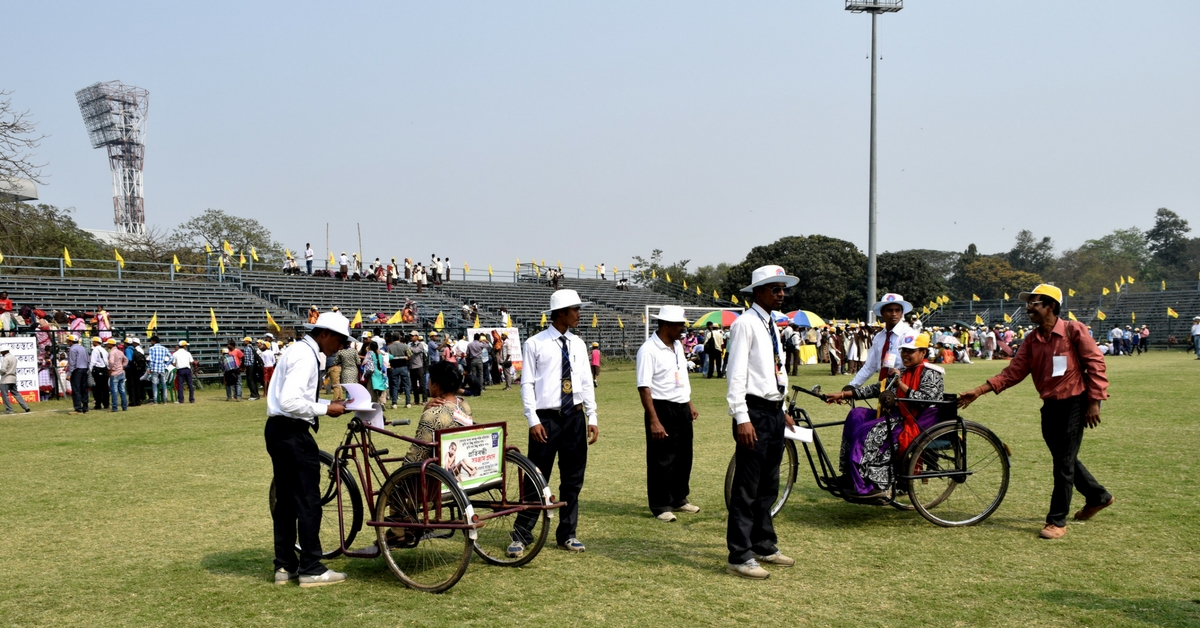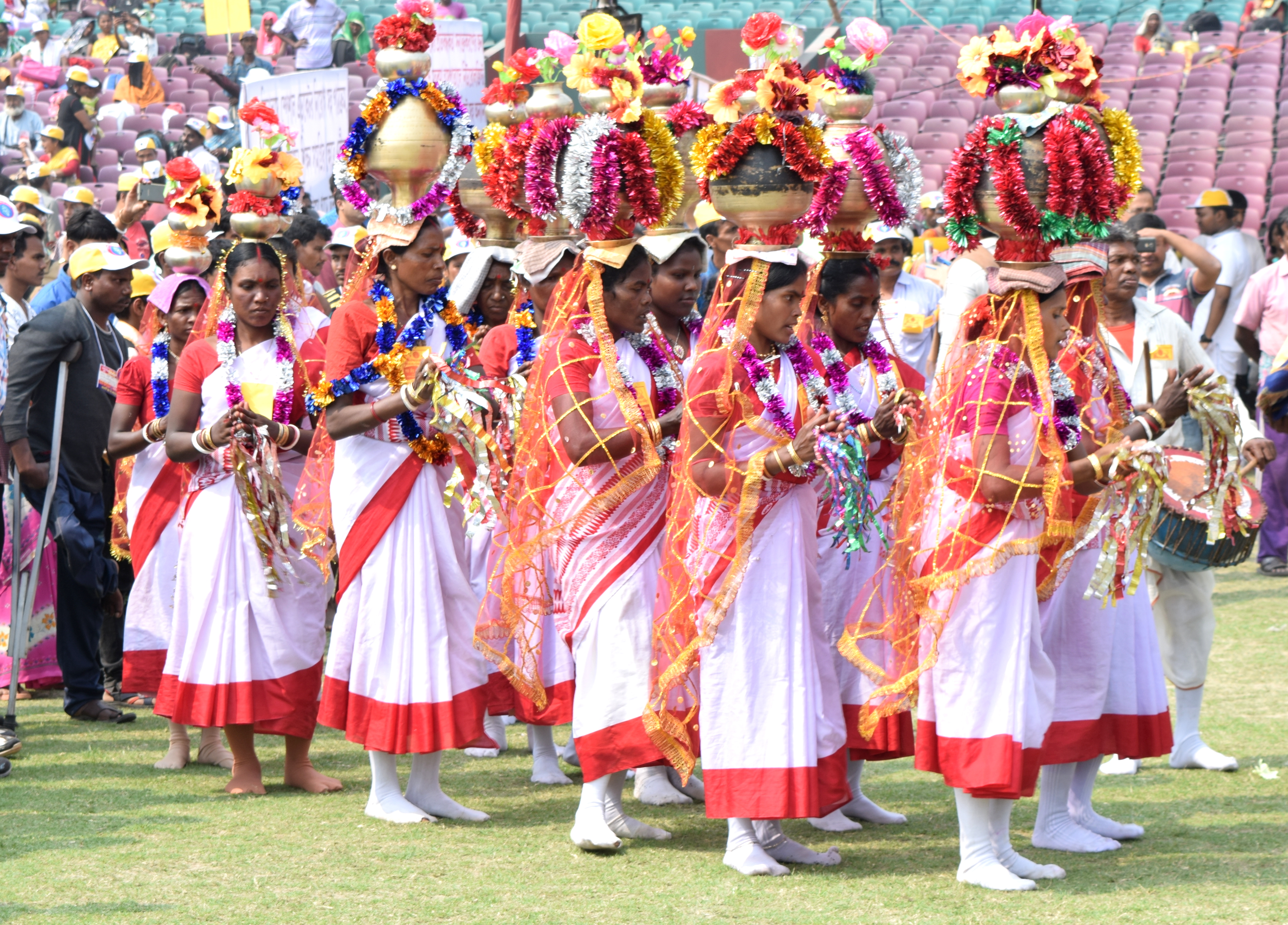India’s great performance at the Rio Paralympics in 2016 is a reflection of the improving scenario for para-sports in the country. Shampa Sengupta writes about a West Bengal event that celebrates the spirit of sports for the disabled.
Rajia Khatoon, who came all the way from the small village of Uttar Dinajpur in the Northern side of West Bengal to the iconic Mohun Bagan Club Grounds of Kolkata on 15th February to take part in State-level Sports for Persons with Disabilities, had never heard the name of Deepa Malik. When I told her that Deepa Malik is the first woman to bring medals for India in a Paralympics game, her eyes glistened. She asked me, “Didi, a woman like me went out of India and played? There she won medals?” It was Rajia’s first-ever visit to the city of Kolkata and she was excited to see so many disabled people coming together.
The organiser of this sports event, Paschimbanga Rajya Pratibandhi Sammelani (PRPS), is the West Bengal affiliate of the National Platform for Rights of Disabled (NPRD). PRPS had been organising this sports event for the last 28 years in West Bengal. They also organise similar events at the district level every year, and utilize such events to bring more and more people under a common umbrella.
2017’s annual sports event by PRPS had around 3,000 participants. This was open for children as well as adults with different kinds of disabilities. With more than 50 events enlisted, it was a tough ordeal for volunteers and organisers. But the participants’ enthusiasm was contagious. There were participants from every single district of West Bengal. Logistics needed a lot of attention, from transport arrangements to organising lunch for all.
The inauguration of the event comprised of dances from different tribal areas of Bengal, and as the Chhou dance or the Santhali dance progressed, one could only admire the variety and heterogeneity a single state of India could offer.
Diversity was indeed the key ingredient of the day’s event. There were many dignitaries who were present on the stage during inauguration. Along with senior sports personnel like athlete Jyotirmoyee Shikdar and footballer Shivaji Banerjee, we saw Retired Justice Ashoke Kumar Ganguly of the Supreme Court, as well as many prominent persons who came to cheer the players.
But what made the stage interesting was the presence of senior leaders of different political parties who usually fight with each other on every single issue. The significance of this coming together was indeed attention-grabbing.
West Bengal rarely gets to see leaders from CPI(M), Trinamool Congress, and the BJP all together at the same place, and one does hope that such camaraderie will bring in much-needed changes to the lives of disabled people of West Bengal.
From the implementation of the newly enacted Rights of Persons with Disabilities Act to any existing policies for the disabled, the need of political will to improve lives of disabled is important.
There was also an unexpected guest who dropped in to see what is happening at the Grounds. The present physical trainer of Mohun Bagan team, Miranda Garcia of Brazil, was in the club tent, and came out to investigate the grounds, unaware that the Grounds were given for the Sports event for the Disabled on that day.
Garcia became emotional at what he saw, and cried openly in front of the media while observing that the condition of disabled people remains the same in every country. He said that people with disabilities are treated in the same manner in his country as well. The spirit of the disabled athletes made him happy. He said he would take this particular memory back to Brazil and talk about it when he goes back there.
In fact, the Rights of Persons with Disabilities Act of 2016 has a specific section on Sports. This is an important inclusion, as it was not present in our previous law. The banners on the grounds demanded a National Para-Sports Policy for the country. That is something even the wins at the Rio Paralympics have not brought in yet. A cut in budgetary allocations in the Central Government’s Budget for 2017 for para-sports is also alarming.
NPRD India took a Resolution on this issue in its recently concluded Executive Committee meeting.
Rajia faces several forms of marginalization as a rural woman with disability from a minority community. We rejoice that she could come out of her village to participate in a sports event in a big city. Whether she won a medal that day is immaterial.
(The author is an Executive Committee Member of NPRD India.)
Help NPRD India fight for advocacy, policy intervention, and disabled rights by getting in touch on Facebook.
Like this story? Or have something to share? Write to us: contact@thebetterindia.com, or connect with us on Facebook and Twitter.
NEW: Click here to get positive news on WhatsApp!
If you found our stories insightful, informative, or even just enjoyable, we invite you to consider making a voluntary payment to support the work we do at The Better India. Your contribution helps us continue producing quality content that educates, inspires, and drives positive change.
Choose one of the payment options below for your contribution-
By paying for the stories you value, you directly contribute to sustaining our efforts focused on making a difference in the world. Together, let's ensure that impactful stories continue to be told and shared, enriching lives and communities alike.
Thank you for your support. Here are some frequently asked questions you might find helpful to know why you are contributing?


